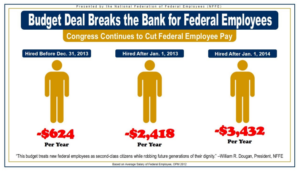
Last week, the Budget Conference Committee announced that it had reached an agreement, unveiling the Bipartisan Budget Act of 2013. The bill was then passed by a 332-94 vote in the House and awaits a vote in the Senate before final passage. In its current form, the Bipartisan Budget Act of 2013 sets overall discretionary spending for the current fiscal year at $1.012 trillion. In fiscal year 2014, defense discretionary spending would be set at $520.5 billion, and non-defense discretionary spending would be set at $491.8 billion.
The Bipartisan Budget Act of 2013, as it stands, would raise pension contributions for federal employees hired after Jan. 1, 2014 by 1.3 percent. As a result, federal employees hired after Jan. 1, 2014 will be forced to contribute 4.4 percent towards their pensions. These new hires will see no added pension benefit despite being forced to contribute significantly more (over $1,000 per year on average) to their pensions each year. The variances in pension contributions create three classes of federal employees, all of whom could have identical job descriptions, yet have significant differences in take-home pay.
The cut to federal employee take-home pay comes on the heels of a similar cut made in 2012 that increased pension contributions for new federal employees by 2.3 percent. As a result, federal employees hired after Jan. 1, 2013 were forced to pay 3.1 percent towards their pensions with no added benefit.
Of all the constituencies affected by the proposed budget, federal employees are among the hardest hit. One of the largest single-item cuts in the bill comes in the form of increased pension contributions for new federal employees. This change would cost newly hired federal workers a collective $6 billion over the next ten years. This major change in federal employee pensions would bring the total that federal workers have contributed through targeted cuts to pay and benefits over the last three years to $120 billion, about $60,000 per federal worker. Congress’ repeated targeting of federal employees has been detestable, yet it continues year after year.
Following the announcement of the Budget Conference Committee, NFFE National President William Dougan weighed in, stating that this budget transformed new federal employees into ‘second-class citizens.’ Read President Dougan’s full statement on the Bipartisan Budget Act of 2013 here.

